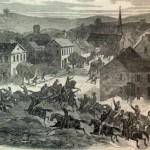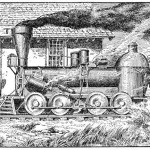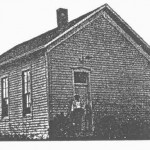The wording of the Fifteenth Amendment to the U.S. Constitution is short and simple. It reads, “The right of citizens of the United States to vote shall not be denied or abridged by the United States or by any state on account of race, color, or previous condition of servitude.”
The Amendment was passed by Congress as part of Reconstruction in 1869, ratified by the necessary three-fourths of the states, and became the law of the land in 1870. But the Fifteenth Amendment did not sail smoothly through that process.
The idea of allowing ex-slaves to vote was a controversial one; Southern members of Congress rejected it outright, and those from the North were divided in their support. Even Indiana’s two senators did not agree on the matter; ex-governor Oliver P. Morton favored the Amendment, while Thomas A. Hendricks opposed it.
Nevertheless, the Amendment’s passage through Congress was nothing compared to the obstacles it would face in states like Indiana.
The Thirteenth Amendment, which outlawed slavery, had cleared the Indiana General Assembly within one week in 1865. The Fourteenth Amendment enjoyed a similarly swift passage through the state legislature in 1867. But when the Fifteenth Amendment arrived at the legislature’s door on March 1, 1869, it was labeled a “firebrand” that might delay the body’s consideration of other matters.
The first argument occurred over when to set the matter for a vote. At the request of Governor Conrad Baker, and over the strong objection of Democrats, a vote was scheduled for the fourth of March. That day, rather than vote on ratifying the Fifteenth Amendment, “seventeen Senators, and thirty-seven Representatives, all Democrats, resigned.” There was no quorum, and all activity at the General Assembly ground to a halt.
Governor Baker ordered a special election to be held on March 23rd. Most of the legislators who had resigned won their seats back. The governor ordered the General Assembly to get back to work on April 8, 1869. The Republican members reported to the State House, but their Democratic counterparts did not, out of fear that the Fifteenth Amendment would be called up for a vote. A few days later, though, the Democrats appeared, and the two sides agreed upon a date in May for considering the Amendment.
The day before that vote, ten Democratic senators, and forty-one Democratic representatives, announced their resignations. The Democrats believed this left the legislature without a quorum, but the Republicans were not so sure. In the Senate, some of the men who had resigned were still physically present in the chamber, so the Republicans considered them to be present but not voting. In other words, Republicans believed their attendance at the session gave the body the quorum it needed to bring the Fifteenth Amendment up for a vote, at which it passed.
The Amendment then went to the House, where it passed despite disagreement over whether there were enough members present to constitute a quorum in that chamber.
So, was the Fifteenth Amendment legally ratified by the state of Indiana?
Public opinion was hotly divided at the time. The question has long since faded away. But the question of whether members of one party can walk out of the General Assembly if they object to the business at hand remains topical.
A Moment of Indiana History is a production of WFIU Public Radio in partnership with the Indiana Public Broadcasting Stations. Research support comes from Indiana Magazine of History published by the Indiana University Department of History.
Source Article: William Christian Gerichs, “The Ratification of the Fifteenth Amendment in Indiana,” Indiana Magazine of History 9, no. 3 (Sept. 1913): 131-166.






















